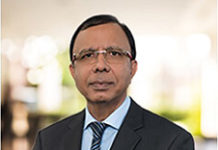BESIX has been present in Africa for several decades, where it has participated in the construction of many state-of-the-art construction projects. Christophe Ledur, Resident Manager in Egypt for BESIX Group, gives us insights into BESIX’s presence on the African continent, and more specifically in Egypt.
How would you describe BESIX’s strategy and differentiating advantages?
On the one hand, we develop long-term strategies with preferential partners. We already have strong partnerships in countries like Egypt with Orascom Construction or the Ivory Coast with PFO. On the other hand, there are projects where we explore and seize opportunities that we evaluate before participating. Regularly this in turn results in new valuable relationships, that we jointly aim to nurture for future business hopefully. Whatever the situation, we can rely on our expertise in (value) engineering, coupled with a genuine sense of client centricity. We have a culture of truly listening to our clients, which, I think, comes from a certain Belgian flair of being humble and not necessarily imposing our views on them (Christophe smiles). In our African portfolio you mainly find complex or iconic projects, with a high degree of engineering, and requiring thorough project management capabilities, BESIX’s signature, said otherwise.
Can you comment on BESIX’s presence on the African continent, and Egypt in particular?
We focus on construction projects, but also increasingly on projects including financing and/or operations and maintenance. In countries like Egypt, Cameroon, Morocco, or the Ivory Coast, we have developed large projects such as high-rise or complex buildings, or commercial centres. We are also active in the construction of sport stadiums, a segment where we developed expertise in the Middle East and Pacific regions. We also leverage our worldwide expertise in marine works, infrastructure projects like bridges and tunnels, and industrial or environmental projects, like hydroelectric plants, units for drinking water production or wastewater treatment. African countries increasingly want to develop such facilities and we are keen to team up and bring our expertise in this field. In Egypt, we have had the immense honour to be chosen by the Egyptian Ministry of State for Antiquities to build the Grand Egyptian Museum in Cairo. It gives an unprecedented opportunity to admire a unique collection of objects dating back to the fascinating, almost mythical, period of the pharaohs. In the sector of marine works, another of our flagship projects is the Ain Sukhna Product Hub in the Gulf of Suez. BESIX completed this 3-km long docking facility for gas tankers in less than a year, while the existing port remained in operation. BESIX also built the impressive Mall of Egypt, a vast commercial complex with shopping facilities, cinemas, and restaurants.
What is your vision on the African construction market?
Not surprisingly, in Africa the market differs from country to country and depends on the nature of clients, i.e. public authorities or private companies. The market is also very much depending on financing possibilities, local or international, private, or public. All this adds a degree of complexity to commercial approaches, but it also gives us an opportunity to show what we excel at, namely show a true willingness to listen to clients’ needs and requirements and bring our project management and value-engineering capabilities. The African market is competitive by nature and attracts national and international players. At BESIX, we position ourselves more on very large, complex projects, where the recipe is to offer a combination of engineering expertise, good client relations, a financing solution, and excellent references. We also strive to identify and partner up with local champions. In Egypt, we systematically team up with Orascom Construction, the largest Egyptian construction company. A specificity of the construction sector is that it is either growing or shrinking, but it never totally collapses. Based on BESIX’s presence in various geographical markets, when one market is contracting, we often can rely on new contracts in another one, like in recent years in Africa. We monitor the evolution in certain countries, further to government renewals, elections, or international agreements with institutional bodies, like the International Monetary Fund, the World Bank or financing institutions. Having the right connections and stable relationships with potential partners is key, so that we can be on their radar should an opportunity arise.
What are your expectations for the coming years?
We hope and expect that African countries will continue to expand their key infrastructure, where BESIX definitely has a role to play in this part of the world.
I personally aim for continuity of activities in Egypt, and I am also looking at other neighbouring countries, such as Jordan or Libya. In Egypt, we are actively working on certain opportunities, which we hope will materialise into other iconic references. While we also want to leverage on specific projects that we have developed elsewhere, our reference book speaks for itself, we are keen to co-create with our partners and develop projects which we not only build and finance, but also operate and maintain for a period of time.
![[:en]BESIX_Color Logo_No background[:]](http://perspectives-cblacp.eu/wp-content/uploads/2023/02/BESIX_Color-Logo_No-background-696x210.png)


